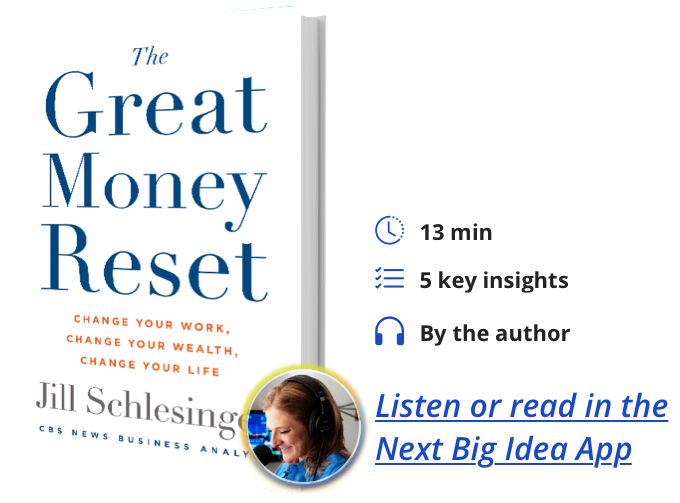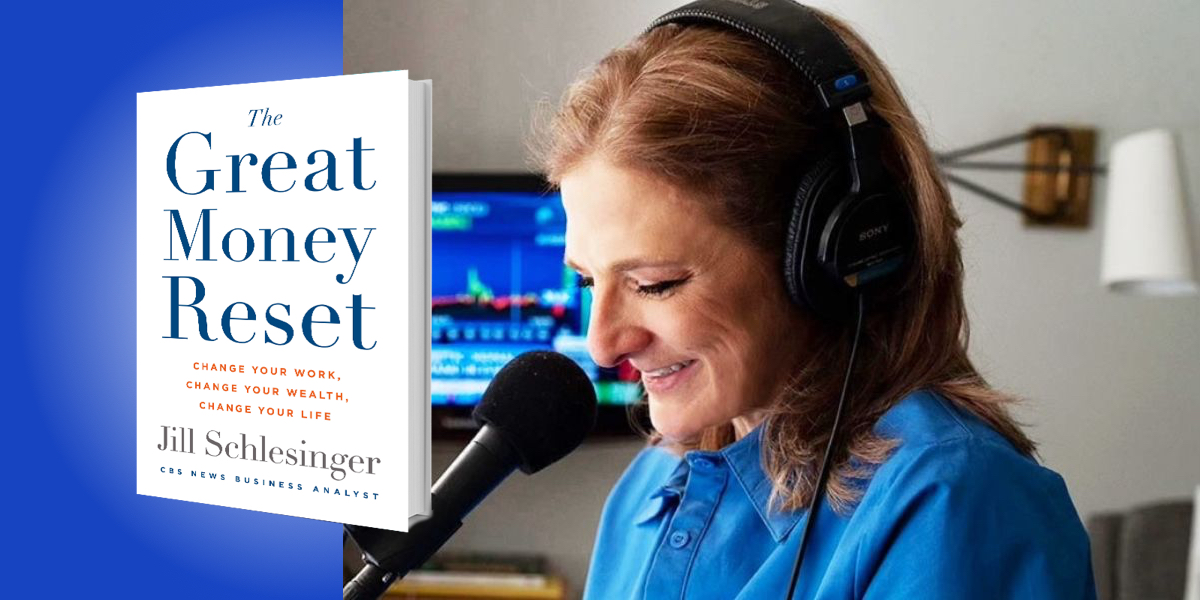Jill Schlesinger is an Emmy and Gracie Award winning CBS News Business Analyst, Certified Financial Planner, and podcast host of Jill on Money.
Below, Jill shares 5 key insights from her new book, The Great Money Reset: Change Your Work, Change Your Wealth, Change Your Life. Listen to the audio version—read by Jill herself—in the Next Big Idea App.

1. Take a good, hard look.
Many of us fantasize about making proactive changes to our lives, whether it’s telling a boss to take a job and shove it, finding a new place to live, or simply listening to a quiet, internal voice that says we must step back and figure out a new path. But few of us turn those fantasies into reality. We get stuck in neutral, unable to break with our existing reality.
To reset, you have to understand where you are today. That starts with calculating what you own (assets) and what you owe (liabilities). Importantly, once you’ve tallied your assets, ask yourself which are liquid—ones that can easily be converted to cash without lag time or a major tax burden.
When going through a transition, you might need more cash than you thought to cover expenses you never could have predicted, to maintain the lifestyle to which you’ve become accustomed, or simply to give yourself the peace of mind of a safety net.
Taking a good, hard look is the key to learning whether your dreams of a change are realistic, or maybe you’ll need to tone down those dreams while still getting most of what you want. Maybe the knowledge that you could make a change is all you really needed in the first place. Regardless, taking a good, hard look will provide control, allowing you to take smarter, more thoughtful, and perhaps more nuanced risks.
2. Curb your consumption.
In addition to tallying up what you have saved and any obligations, you’ll also need a detailed understanding of your spending habits. I hear you groaning, but look, here’s the issue: people discount the idea of focusing on their spending or consumption because doing so forces an examination of what’s really going on behind our behaviors.
“People from all walks of life are rethinking their consumption habits.”
You might think you must blow your life savings to make a big change—but maybe not. People from all walks of life are rethinking their consumption habits, with an eye toward reducing expenses and directing those resources toward dreams. Rather than arriving at ironclad judgments about any particular consumption choice, it’s most helpful to become more mindful of how we’re spending our hard-earned money and how it makes us feel.
Uncovering our spending rules isn’t straightforward: it leads into the complex netherworld of emotions. Here are some questions to help you understand your consumer behavior and its underlying psychology:
- What do I really need in my life, and what do I only think I need?
- Do I ever find myself feeling guilty, insecure, or anxious about a purchase?
- Do I find myself making impulsive purchases? If so, when and why?
3. Diversification is not dead.
After a dreadful 2022 for investors (when both stocks and bonds got hammered) a lot of people are questioning the tried-and-true advice of not putting all of your eggs in one basket and sticking to low cost passive index funds. I am here to announce that asset allocation and diversification are not old-timey tropes. They still work and are critically important for people undertaking significant money resets.
Disciplined investing can enable major life or career changes without jeopardizing your entire future, and it can also help navigate times of uncertainty. The key to successful investing is not being a genius who always stays a step ahead of the market. The key to successful investing is avoiding unforced errors. Don’t look for the next rocket-ship stock; slow, steady, and passive wins the day.
That said, if you want to take a flier on crypto, your company stock, or your cousin’s great investment idea, make sure to limit your commitment to less than five percent of your total invested assets.
4. Educate yourself.
Many people considering a major money reset make obtaining more education part of the mix. They might want better job prospects or want to boost their current earnings. They might wish to cultivate skills for an entirely new career. They might not know what they want and think going back to school is a perfect waystation while they figure it out.
“Think critically about whether more education makes sense for you.”
Acquiring more education can help advance our professional lives, but quite often it also leads down a costly and time-consuming path. Before rushing to send that fat tuition payment, and before you potentially quit your job to go back to school, think critically about whether more education makes sense for you at this point in time.
Maybe it does, but maybe not. Even if it does make sense, there could be less costly educational options. To make sure that you’re making a rational choice, here is a simple, three-step analysis:
- Identify the precise skills, knowledge, or credentials you hope to gain by going back to school and detail how your career will benefit.
- Determine how you would pay for school. Are you going to ask your family? That might come with strings attached. Are you going to plow through your own savings? Will you take out a loan? Be careful here.
- Are there any cheaper ways to get where you want to go?
5. Planning a reset can help break through fear.
Many people start thinking about a money reset only after a momentous event shakes their life. They scramble to reorient finances, a process that can feel stressful or impossible, especially when emotions are on fire. Planning in advance for a potential Great Money Reset can benefit all of us enormously.
The process of planning the reset itself can allow us to break through fears and give us time to acclimate emotionally to the idea of change. Thinking proactively about finances can position ourselves to move decisively toward our dreams when the right time arrives. If we don’t wind up making the specific change we envisioned, we still leave ourselves better positioned to handle unforeseen circumstances, indulge in new desires, or to enjoy financial security.
Ultimately, planning for a Great Money Reset is about building financial resilience and maximizing our ability to take on opportunities down the road. By taking responsibility now for future happiness, we can increase the odds that we’ll feel in control of our destinies. A Great Money Reset isn’t fundamentally about money. It’s about rethinking our lives.
To listen to the audio version read by author Jill Schlesinger, download the Next Big Idea App today:
































